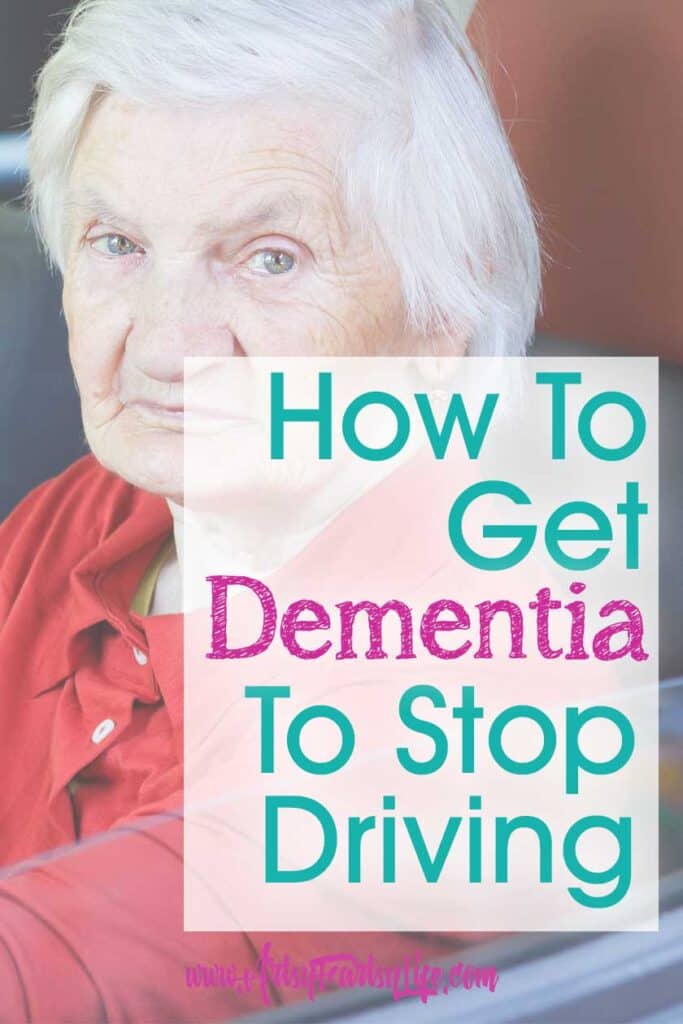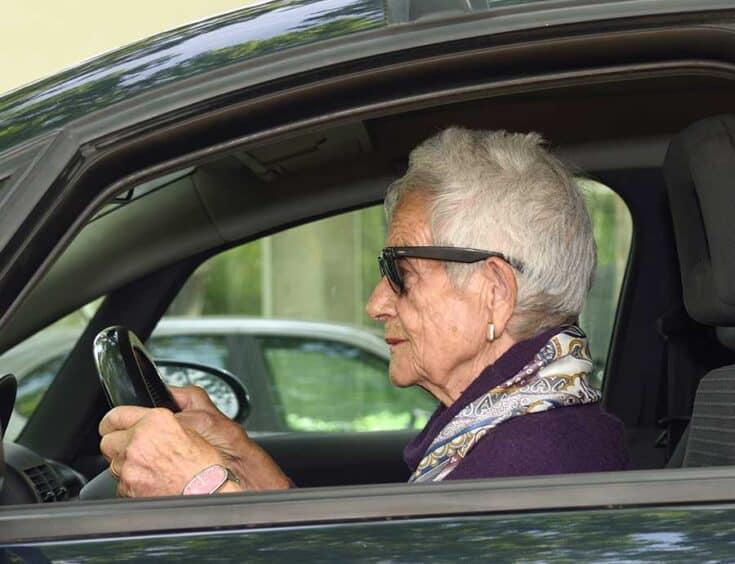When should you take away the keys or get their driving privileges revoked? Tips and ideas for how to explain why Alzhemiers or dementia loved ones can't drive their car anymore.

Our Mom Driving Story
We started noticing Mom having trouble a couple of years ago. She was forgetting things, repeating herself and losing weight from not eating.
But she still could drive herself around to the grocery store, Walmart and to go pick up wine.
We live about an hour away from her old condo and she used to drive herself up for family functions, until one day she started saying she was too busy or too tired to come.
Turns out she had taken a wrong turn one day and wound up in Tampa, hopelessly lost, confused and crying!
When Is It Time To Take Away Their Keys?

Okay, let's just say for the record here, figuring out when your older loved one isn't coordinated enough to drive is different than figuring out if your Alzheimers or Dementia parent is not able to drive.
LBD (Lewy Body Dementia) symptoms include "changes in cognition, movement, sleep, and behavior." source NIH
Our Mom has wet brain, also known as Wernicke-Korsakoff syndrome, which causes memory loss AND motor function problems.
So we are not just dealing with a lack of motor function as dementia caretakers, we are trying to determine if they will forget how to get home, remember the what a stop sign means or get turned around one street away from home.
We took Mom's keys away as soon as I realized I would never let my kids ride in her car with her alone. That was a super hard day, to realize that my Mother-In-Law, who had been so independent would now have to rely on someone else to drive her around...sigh.
That someone turned out to be mostly me. So I added carpooling Mom around to my Mommy Taxi service. As a caregiver, there is temptation to let them do the "easy driving" so you don't have to do it, but that is a recipe for disaster!
Dementia Driving ... A Safety Issue
Let' just get this big one out of the way first. "Letting" your loved one continue to drive could not just impact their lives, but they could cause an accident or hit and kill someone else.
I KNOW, it seems weird to say that you are "letting" an adult do something, but as a caregiver, you are the one that is responsible for making good decisions now that your parent, husband or grandparent is no longer able to make them!
As families and caregivers of dementia loved ones, we are the first ones to notice the warning signs that our LO's driving skills are diminishing.
When it comes to driving and dementia, the medical field recommends that persons with dementia (even mild dementia) stop driving. more about this below!
The Police
I went to a training where a police officer spoke and told horrific stories of loved ones going missing, having driven hundreds of miles away, or getting into accidents and being completely disoriented about where, and sometimes who, they were.
I can't speak for the police of course, but I have to think that they would rather we didn't let our dementia loved ones out in a motor vehicle on the unsuspecting public.

How To Get Your Dementia Loved One To Stop Driving
Okay, now to practical tips about how to get them to stop driving!
NOT YOU!
First off, unless you are a glutton for punishment, it is best that the person who is taking away the keys is NOT YOU!
Find someone or something that is the problem and blame it on them. For real!
Oh, and many of these are suggestions that involve lying or subterfuge. If you goal is to keep your loved one safe and stop them from harming others, you may have to lie about things.
more about lying to dementia loved ones here!
1. Losing Insurance
If your loved one has been banging up other cars or getting into accidents, the easiest way may be if their insurance gets cancelled or the rates become too high to afford.
NO, you can't even run up to the store or to church if you don't have insurance to drive!
2. DMV & Drivers License
When their license is up you can take them to the DMV for a driving test. You can also pretend their license is up and ask the DMV to do a safe driving test (this might not go over well).
3. Have The Doctor Tell Her

I have a great rapport with my Mom's doctor and she was more than willing to back me up that Mom's memory problems, combined with reduced reflexes were a reason to to stop driving.
4. Sell The Car
If you have POA (Power of Attorney) or are on the title, you could sell their car and get rid of the problem entirely. If financially able, they might just buy a new one, but oftentimes you can fake them out on this too!
5. Disable The Car

If you are mechanical, you can pop the hood and make it non-working. This is not practical for me because I could do something super wrong that could hurt the car, but I do know there are people who have done this! They recommend disconnecting the battery, take out the ignition fuse, removing the distributor cap or taking out the spark plugs.
6. Hide The Car
You could park it around the corner or at a friends house, out of the way. Many dementia peeps are not great problem solvers so they will look out, see the car is not there and forget they were going to drive.
7. Say The Car Is In The Shop
Whether you sell the car or simply hide it, you can say that the car in the shop having some work done on it. Keep it simple, say it wouldn't start or it needs the brakes checked, don't try to make up a huge lie that you will have trouble remembering!
8. Wrong Day For The DMV
You can also say the registration is expired and it is the wrong day to go to the DMV (Department of Motor Vehicles) to get it renewed. Everyone thinks that government agencies are a pain, so this one will be believable!
9. Hide keys
Start hiding the different sets of car keys for the car. Many dementia or Alzheimer people lose things often, so not knowing where their keys are will just fit into the rest of the lost items list.
10. Lost Keys, Have To Order A New Set
If they become determined to finding the lost keys, you can say they were totally lost and now you have to order a new set. In my house, I can use the "they will be coming in a couple of days" for a few weeks before she notices.
11. You Emailed or Called And Waiting For An Answer
You can also say you emailed or called and are waiting for someone to get back to you. This could be the shop, the DMV or even the locksmith. Because time is not straight to them, this one can be used frequently.
11 Ways To Stop Dementia or Alzheimers From Driving

Tips and ideas for how to get your Alzheimers or Dementia loved one to stop driving their car.
Instructions
- Losing Insurance
- DMV & Drivers License
- Have The Doctor Tell Her
- Sell The Car
- Disable The Car
- Hide The Car
- Say The Car Is In The Shop
- Wrong Day For The DMV
- Hide keys
- Lost Keys, Have To Order A New Set
- You Emailed or Called And Waiting For An Answer
Notes
I KNOW, some of these are lying, but we need to do what is necessary to keep our loved ones and others safe.
Should You Stop Your Loved One From Driving Wrapup
This one is super hard as a caregiver. Not only will taking the keys away protect your loved one and other people, but you know it will add more to an already full plate for you!
And most of these ideas involve lying to your loved one over and over again.
But this is super important! They could get hurt or lost and other people's lives are in danger when they lose the ability to drive safely. It is up to family members to be the voice of reason!
Additional Resources
- The Mayo Clinic recommends that even people with MILD dementia stop driving
- The National Library of Medicine says "Driving performance may be affected even in the early stages of Alzheimer's disease"
- Law firm info on this! Dementia and driving
More Alzheimers Caregiver Posts
23 Fun Ways To Battle Dementia and Alzheimers Caregiver Burnout
As an Alzheimers caregiver it is easy to forget to care for yourself. Here are some fun ways to avoid caregiver burnout!
Why Won't Your Alzheimers or Dementia Parent Take Showers
Getting your Alzheimers parent to take a shower is a challenge. Here are some tips and ideas on how to make it easier on them (and you!)
Why Do Dementia and Alzheimers People Make Up Stories?
Whether you call it lying, telling stories or confabulation, there are some tall tales when you are caring for a dementia loved one.
Tips and Ideas To Get Your Alzheimers or Dementia Parent To Eat
Oh my gosh, the stuggle is real! Getting Mom to eat is a daily challenge. Some of my best tips and tricks for getting her to eat!
Dealing With Lying To Your Dementia or Alzheimers Loved One
This one was super hard for me and my family. Sometimes lying to your loved one is the kindest thing you can do for them.









